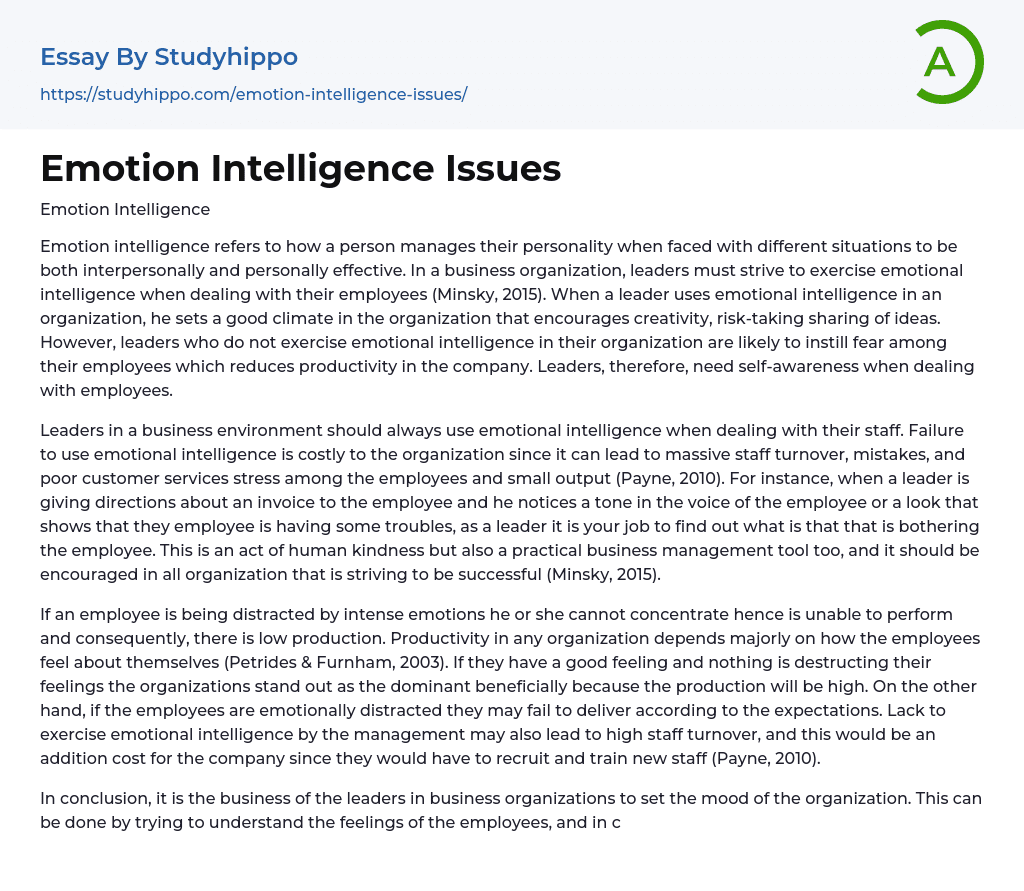Emotion Intelligence
Emotion intelligence refers to how a person manages their personality when faced with different situations to be both interpersonally and personally effective. In a business organization, leaders must strive to exercise emotional intelligence when dealing with their employees (Minsky, 2015). When a leader uses emotional intelligence in an organization, he sets a good climate in the organization that encourages creativity, risk-taking sharing of ideas. However, leaders who do not exercise emotional intelligence in their organization are likely to instill fear among their employees which reduces productivity in the company. Leaders, therefore, need self-awareness when dealing with employees.
Leaders in a business environment should always use emotional intelligence when dealing with their staff. Failure to use emotional intelligence is costly to the organizat
...ion since it can lead to massive staff turnover, mistakes, and poor customer services stress among the employees and small output (Payne, 2010). For instance, when a leader is giving directions about an invoice to the employee and he notices a tone in the voice of the employee or a look that shows that they employee is having some troubles, as a leader it is your job to find out what is that that is bothering the employee. This is an act of human kindness but also a practical business management tool too, and it should be encouraged in all organization that is striving to be successful (Minsky, 2015).
If an employee is being distracted by intense emotions he or she cannot concentrate hence is unable to perform and consequently, there is low production. Productivity in any organization depends majorly on how the employees feel about themselves (Petrides & Furnham, 2003). If they have
good feeling and nothing is destructing their feelings the organizations stand out as the dominant beneficially because the production will be high. On the other hand, if the employees are emotionally distracted they may fail to deliver according to the expectations. Lack to exercise emotional intelligence by the management may also lead to high staff turnover, and this would be an addition cost for the company since they would have to recruit and train new staff (Payne, 2010).
In conclusion, it is the business of the leaders in business organizations to set the mood of the organization. This can be done by trying to understand the feelings of the employees, and in case they have some problems the leaders should always try to assist the employee. Good moods equal’ good work while bad moods are not good for businesses. As a leader in any business organization, your expertise in emotional intelligence will be of high benefit and will determine whether the organization will be successful or not.
References
- Payne, W. L. (2010). A study of emotion: developing emotional intelligence; self-integration;
relating to fear, pain and desire. - Petrides, K. V., & Furnham, A. (2003). Trait emotional intelligence: Behavioural validation in
two studies of emotion recognition and reactivity to mood induction. European journal of personality, 17(1), 39-57. - Minsky, M. (2015). The emotion machine: Commonsense thinking, artificial intelligence, and the
future of the human mind. Simon and Schuster.
- Ambition essays
- Anger essays
- Betrayal essays
- Boredom essays
- Confidence essays
- Courage essays
- Desire essays
- Disgrace essays
- Doubt essays
- Empathy essays
- Fairness essays
- Fear essays
- Feeling essays
- Forgiveness essays
- Grief essays
- Guilt essays
- Happiness essays
- Harmony essays
- Hate essays
- Honesty essays
- Honor essays
- Hope essays
- Humanity essays
- Inspiration essays
- Kindness essays
- Laughter essays
- Loneliness essays
- Lost essays
- Loyalty essays
- Need essays
- Passion essays
- Pressure essays
- Pride essays
- Regret essays
- Respect essays
- Responsibility essays
- Sarcasm essays
- Shame essays
- Suffering essays
- Suspense essays
- Tolerance essays




